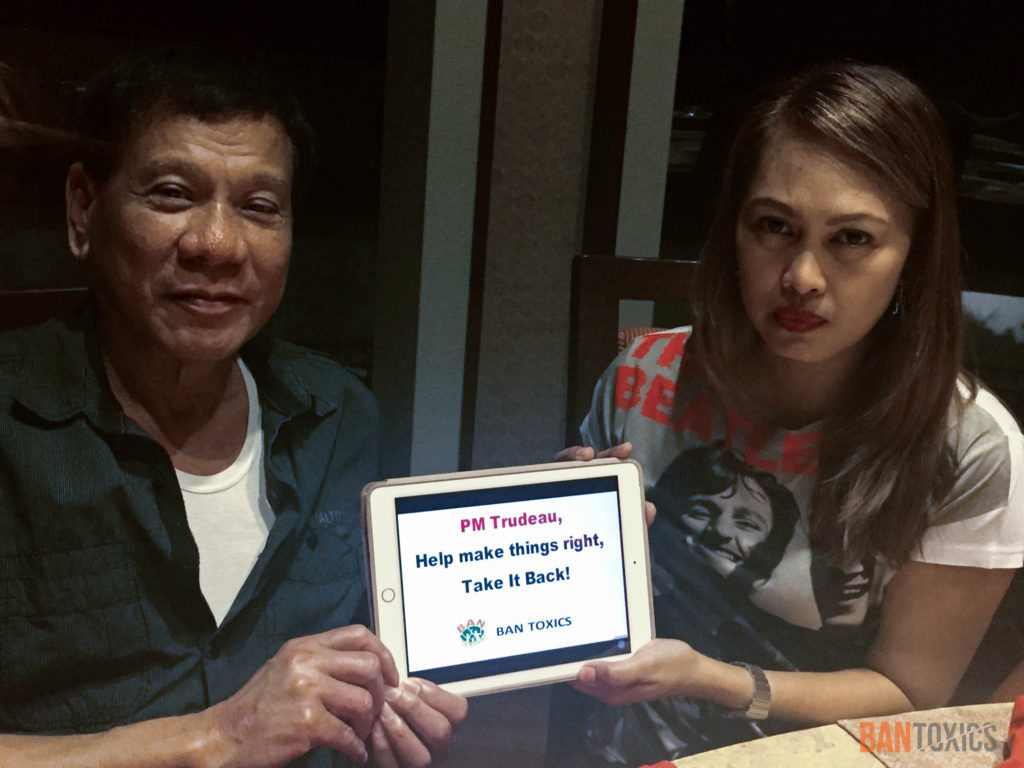
During the campaign, President Rodrigo Duterte expressed strong outrage on Canada’s failure to re-import its own garbage, calling it a “derogation of our national dignity.” (Photo taken at the Marco Polo Hotel, Davao on 08 November 2015.)
MANILA – Environmental justice group BAN Toxics today called on President Rodrigo Duterte to tell Canadian Prime Minister Justin Trudeau to bring back Canada’s trash.
“We are waiting on the President to make good on his campaign promise to hold Canada and Trudeau accountable for their trash,” Anna Kapunan, BAN Toxics’ Campaign and Advocacy Specialist said. The call came amidst the country’s preparations for the Association of Southeast Asian Nations Summit next week.
“Canadian trash has been rotting in the Port of Manila for several years. Trudeau should take it back with him home to Canada,” Kapunan added.
During the 2016 presidential elections, Duterte expressed outrage over Canada’s failure to re-import its own garbage, calling it a “derogation of our national dignity.” He also urged the previous administration to file a diplomatic protest against the Canadian government for its 1,300-ton trash that was wrongly declared as plastic scraps for recycling. The trash, composed of used adult diapers, household wastes, plastics, among others, was sent to the country in mid-2013.
In a previous statement, BAN Toxics’ CEO Richard Gutierrez said that “it is convenient to label waste shipments as household or municipal waste and call these non-hazardous because poor importing countries often lack technical equipment to scientifically determine that such wastes are indeed hazardous.”
Gutierrez added that “bacteria and contaminants building up in dirty diapers and rotten food and the toxic chemicals leaching out of the odd battery or e-waste in the [Canadian] trash” has negative environmental and health impacts.
In 2015, 26 of the 103 container vans filled with Canadian trash were illegally disposed of in Capas, Tarlac. That same year, BAN Toxics asked the Basel Convention, a global agreement against toxic waste dumping, to intervene. Canada and the Philippines are signatories to the Basel Convention, and are legally bound to implement the provisions of the treaty.
In 2016, Canadian Environment and Climate Change Ministry claimed that “wastes that ended up on Philippine shores were not illegal under Canadian rules.” The Canadian position flies in the face of international law, which prohibits countries from using as an excuse the absence of laws in complying with its treaty obligations.
When Trudeau visited the country in November last year for the Asia Pacific Economic Cooperation Summit in Manila, he said that a “Canadian solution (was) being developed” with regard to the Canadian waste.
From the previous administration until the present, the Canadian solution seems to be to wait and hope Filipinos forget. “We call on Secretary Alan Peter Cayetano and the Department of Foreign Affairs to lodge a diplomatic protest against Canada and to re-open the issue in the Basel Convention for proper proceedings to ensue,” Kapunan said. “Canada’s toxic waste dumping is about upholding our national dignity, ensuring environmental protection, and protecting the health of Filipinos. PM Trudeau, Filipino lives matter!,” added Kapunan.
